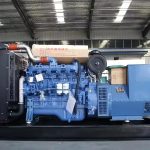Introduction
In the realm of product validation, ensuring reliable and consistent power supply is crucial for conducting tests and experiments. Diesel generators serve as a dependable source of backup power, offering a stable electricity supply to validate various products under different conditions. This article aims to explore the significance of diesel generators in product validation processes, their key features, benefits, applications, and best practices for utilizing them effectively.
Understanding Diesel Generators
Diesel generators are robust machines that convert diesel fuel into electrical energy through the process of combustion. They consist of an engine, alternator, fuel system, cooling system, exhaust system, and control panel. The engine, typically powered by a diesel fuel supply, drives the alternator to generate electricity. 150KW Diesel Generator For Sale are available in a wide range of sizes, from small portable units to large industrial systems, catering to diverse power requirements.
Key Features of Diesel Generators
1. Reliability: Diesel generators are known for their reliability and durability, making them suitable for continuous operation over extended periods. They provide a stable power supply even in challenging environments or during emergencies.
2. Fuel Efficiency: Diesel engines are more fuel-efficient compared to gasoline engines, resulting in lower operating costs and better overall performance.
3. Power Output: Diesel generators offer high power output capacities, making them ideal for powering a wide range of equipment and machinery during product validation processes.
4. Longevity: Properly maintained diesel generators have a longer lifespan than other types of generators, providing a cost-effective power solution for product validation activities.
5. Quick Start-up: Diesel generators can quickly start and reach full power capacity, ensuring minimal downtime and prompt response to power demands.
Benefits of Using Diesel Generators for Product Validation
1. Continuous Power Supply: Diesel generators offer a reliable source of backup power, ensuring uninterrupted testing and validation processes even in the event of power outages or fluctuations.
2. Versatility: Diesel generators can be used in various settings, from laboratories and research facilities to outdoor testing sites, providing flexibility in product validation activities.
3. Cost-Effectiveness: While diesel generators may have a higher initial investment cost, their long-term operational efficiency and lower fuel consumption make them a cost-effective power solution for product validation projects.
4. Environmental Considerations: Modern diesel generators are designed to meet stringent emission standards and can be equipped with advanced technologies for reduced environmental impact, aligning with sustainability goals.
5. Remote Operation: Diesel generators can be remotely monitored and controlled, allowing for efficient management of power supply during product validation tests conducted in remote locations or off-grid sites.
Applications of Diesel Generators in Product Validation
1. Laboratory Testing: Diesel generators power various equipment and instruments used in laboratory testing, ensuring consistent and reliable power supply for accurate data collection and analysis.
2. Field Testing: In outdoor or remote testing environments, diesel generators serve as a dependable power source for conducting product validation tests under different climatic and environmental conditions.
3. Prototype Validation: During the validation of product prototypes, diesel generators provide the necessary power to simulate real-world usage scenarios and assess the performance and durability of the product.
4. Quality Control Testing: Diesel generators support quality control processes by maintaining a stable power supply for running production machinery and equipment, ensuring consistent product quality standards are met.
Best Practices for Using Diesel Generators in Product Validation
1. Regular Maintenance: Scheduled maintenance and servicing of diesel generators are essential to ensure optimal performance and longevity. This includes checking fuel levels, oil changes, filter replacements, and overall system inspections.
2. Fuel Quality: Using high-quality diesel fuel and proper fuel storage practices are crucial for the efficient operation of diesel generators and preventing potential issues such as clogging or engine damage.
3. Load Management: Properly sizing the diesel generator according to the power requirements of the equipment being used for product validation helps optimize fuel consumption and avoid overloading the system.
4. Monitoring and Control: Implementing remote monitoring systems and automatic control features allows for real-time monitoring of the diesel generator's performance, enabling quick response to any operational issues.

5. Safety Precautions: Adhering to safety protocols, such as proper ventilation, fire prevention measures, and electrical safety guidelines, ensures the safe operation of diesel generators during product validation activities.
Conclusion
Diesel generators play a vital role in product validation processes by providing a reliable and efficient power source for conducting tests, experiments, and quality control activities. Their robust design, high power output, fuel efficiency, and versatility make them an ideal choice for a wide range of applications in various industries. By following best practices for using and maintaining diesel generators, businesses can ensure smooth and uninterrupted product validation processes, leading to accurate results and successful product launches.
